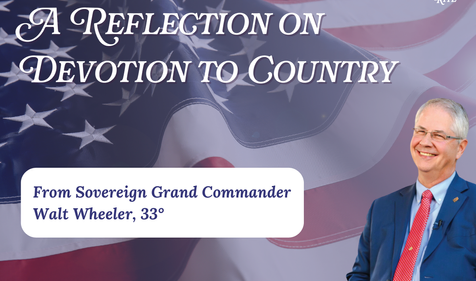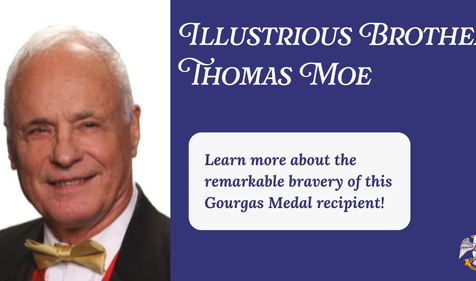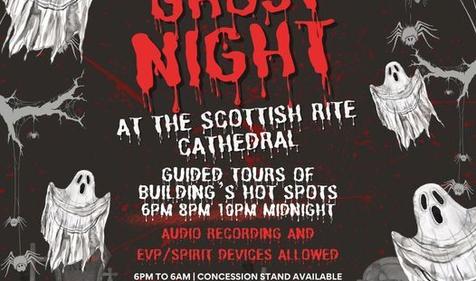Our first class of Hauts Grades Academy scholars have been busy, completing the different levels and assignments necessary to graduate the program. In level 2, participants are asked to complete a round of essays regarding the Scottish Rite degrees and the teachings that have been most influential to them.
We are pleased to announce that we will feature these short essays in a blog series titled “HGA Series: From the Desk of…” and are very excited to welcome our first essay author. Arthur Fred Hebbeler, 32°, is a dual member in the Valley of Toledo, Ohio and Valley of Baltimore, Orient of Maryland. In his essay, he talks about why he chose the 22°, Prince of Libanus or Knight of the Royal Axe, and why he feels most connected to it.
The 22nd Degree has a special place in my heart, because the musical version has a personal connection. In the late 1960s/early 1970s, my father was a member of the Valley of Indianapolis orchestra and its composer/arranger, as well as French horn player. He scored the musical version of the 22nd, and I can remember watching my mom and dad sitting at the card table in our living room copying parts for hours on end (these being the days before desktop composition tools like Finale). And yes, I do remember even hearing a few words that were immediately followed by “Don’t you ever use those words, son!” I wish Dad were alive today so that I could get my hands on a copy of his original work. When I received the degrees in Toledo in 1982, the musical version of the 22nd was performed (no orchestra there, though), and I was one of the candidates chosen to be a part of the costumed cast extras. Dad and I saw the full version in Indianapolis the following spring (right after the 20th degree). So, with that said, on to the degree analysis.
“…[T]hat it is not labor, but idleness that is disgraceful.” Oh, if this lesson were taught more in our lodges and other bodies! Sure, we have brothers who are active and involved, but how many more simply send in a check (often after many notices), collect a dues card, and call themselves “Masons.” We Freemasons do a lot in our communities (“Service to humanity”), but how much more would we be able to accomplish if fifty percent, rather than ten percent, of our membership were involved at least twice a month? And by involved, I don’t mean showing up for a boring stated meeting, agreeing to pay the bills, then drinking a bad cup of coffee and complain about guys not coming to meetings. What if we took the lessons of this degree, and the working tools in particular, to heart, and saw that no one who was able-bodied was idle, and no one who was in need of a job was unemployed, and no one who was in distress, ill, injured, or in old age was left alone and wanting for the necessities of life? Think of the impact on our communities if there were never a Freemason or a Freemason’s family member unemployed, because we were quick to connect them with some gainful employment? What if no Freemason or his family member were ever alone in the hospital because a rotating group of brethren were there to visit—even to just be present? If we were to live the lessons of this degree daily, those around us—even those whom we don’t even know—would see what it means to be and live as a Freemason. Others would say, “Look at those men! I want to be like them.” Or, more likely, the special people in their lives would say, “Look at those men! I want you to be like them.”
In our service to humanity (a lesson well-taught in this degree), we demonstrate what it truly means to be a Freemason—to live, act, and walk as one. In 1966, Fr. Peter Scholtes wrote “They Will Know We are Christians By Our Love.” This folk hymn, based in part on John 13:35, highlights that Christians will be known by their actions, and not their words. We as Freemasons should take this lesson to heart, and through our service and actions, teach the world what it means to be a “true and upright Mason.” Through our work, we demonstrate what we are taught in our several degrees and orders. By doing that work effectively, consistently, and faithfully, others see and, we should pray and hope, learn the lessons as well and seek to join our ranks, not for the intrinsic rewards, honors, titles, and jewels, but to labor in the quarries and forests of the world for the betterment of our communities.
To learn more about the HGA and how you can register, please visit our website.
Related Stories
Discover additional Scottish Rite blogs and news on this topic.
-
A Reflection on Devotion to Country from Sovereign Grand Commander Walt Wheeler, 33°
Leadership
Read More about A Reflection on Devotion to Country from Sovereign Grand Commander Walt Wheeler, 33°
-
Illustrious Brother Thomas N. Moe Awarded the Gourgas Medal for Exemplary Service to Freemasonry and Humanity
News
Read More about Illustrious Brother Thomas N. Moe Awarded the Gourgas Medal for Exemplary Service to Freemasonry and Humanity
-
Valley of New Castle Finds Non-Traditional Way to Raise Funds
Inspiration
Read More about Valley of New Castle Finds Non-Traditional Way to Raise Funds



